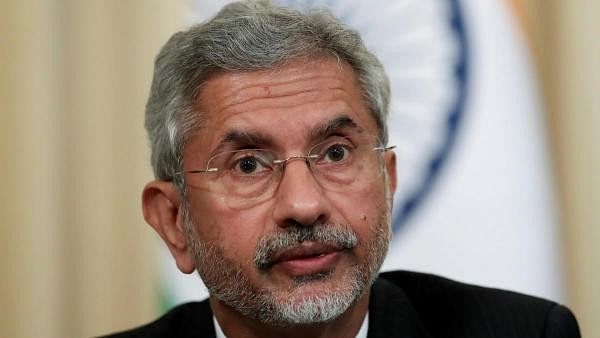
External Affairs Minister S Jaishankar
Credit: Reuters File Photo
Geneva: External Affairs Minister S Jaishankar on Friday said he had no problem with other countries commenting on Indian politics, but they should also be prepared to hear his comments on their politics.
He made the sharp remarks during his interaction with the Indian community here.
Jaishankar was asked a question about some foreign diplomats based in New Delhi having personal meetings with certain opposition leaders in their state.
The External Affairs Minister did not answer it directly but said, “I have no problem if people comment about our politics, but then, I think in fairness, they should also be ready to hear my comments about their politics.”
“And so, how to get a more mutually respectful world, more equal world? Because everybody says they know,” he said and then referring to George Orwell’s ‘Animal Farm’, he said, “Some are more equal than others. How do you actually create that?”
“I think that's also one of the big debates, which is today taking place in the world,” said the EAM, who is on the last leg of his three-nation trip - earlier he visited Germany and Saudi Arabia.
Jaishankar agreed that women’s safety is an issue in India - in apparent reference to the rape and murder incident at Kolkata’s RG Kar Medical College and Hospital last month - and said, “I don't think there can be a single person in the country who's not outraged by what happened.”
“The factors women's safety, crimes against women, is an issue in our country. It may be an issue in other people's countries as well. That doesn't mitigate it enough,” he said.
He also recalled Prime Minister Narendra Modi’s speech from the ramparts of the Red Fort in which he said Indians teach or say things to daughters when they go out late at night but “do you do that to your sons?”
Speaking about alleged criticism India faces on international platforms on human rights, he said, India has “allowed, encouraged, facilitated, accepted, people with diversity and continued on that diversity,” and added, “When I look at human rights is to try to politely and hopefully convincingly tell people, I'm actually in a much better starting point than any of you.”
“Because, you actually have suppressed or distorted or underplayed much of the diversities and divergences and pluralisms in your society. They have less because, actually they have suppressed it, or they have eliminated it,” Jaishankar said, pointing out that the conversations in those societies (from western countries) will necessarily be different from India’s as they “don't have and never value that kind of divergence.”
Jaishankar also said it is a logistical nightmare to provide voting rights to roughly about 20 million non-resident Indians in 195 countries and also what India will be speaking at the UN conference on sustainable development later this month – “Lip service is being paid to it, but practical steps are not being given.”
While answering another question about the recently released television series on the hijacking of IC814 in 1999, Jaishankar also revealed that his father was on a hijacked flight in 1984 and said he had a unique window on “both sides” in such situations – the perspective of family members and those in the government.
In his almost 40-minutes speech, he dwelt elaborately on India’s achievements during the last 10 years (since Prime Minister Narendra Modi took oath in 2014 for the first time) rattling off numbers for different sectors such as road length, airports commissioned and completed, houses built etc.
“I want to share with you this sense that looks like the bricks and mortars part of the infrastructure development, something which has held us back, which every one of you has personally experienced, that is changing,” he said.
“But changing that is not enough, because at the end of the day, you know, countries, societies are about people. So how are the people changing? Now the people changing is particularly important,” he asserted.
He also spoke about plugging leaks in the food distribution (known as public distribution system, PDS) and increasing facilities for higher education among other issues.
The event was followed by a cultural programme.
“A nice interaction with Indian community and friends at Geneva today. Spoke about India’s advances in infrastructure, technology, innovation, skilling and greater role in global economy,” Jaishankar said in a post on X about the event.
Jaishankar also honoured the Indian reformer and educator Hansa Mehta by naming a hall in her memory at the country's Permanent Mission here.
He also paid his respects to Dr Bhimrao Ambedkar, the architect of the Indian constitution at his statue at the premises. Earlier, he started the day by planting a sapling at the premises of India’s office at the UN.
He also dedicated the new building, which houses India's Permanent Missions to the UN, WTO and CD, as well as hosts India’s Consulate in Geneva.